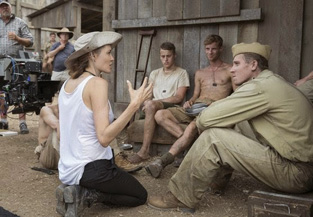They Shoot Oscar Prognosticators, Don't They?
The Sony Leaks: Politics, Oscar and Hollywood’s “Women Problem”
By J. Don Birnam
December 23, 2014
The Sony Leaks
On to the topic du jour: politics and the Oscars. The Academy Awards are no strangers to controversy. One year, a producer of The Hurt Locker was banned from the ceremony for supposedly violating AMPAS’s so-called anti-campaigning rule. The Oscars are a prestige event but also a money game. Expensive consultants are hired to run costly campaigns, so people are bound to get down and dirty. And that’s just the campaigns themselves. In past columns we’ve already explored politics at the Academy Awards, from Michael Moore’s Iraq-related “Shame on you, Mr. Bush” to Marlon Brando’s “Protest of the Film Industry’s Treatment of the American Indian,” to Vanessa Redgrave vs. Paddy Chayefsky on Palestine and Israel.
This year, the controversies so far are not of the campaigners’ direct making. As you likely know, on December 9th, Gawker released several gigabytes of e-mails they had obtained from a group that had hacked Sony Pictures’ systems. The hack was political and implicated international relations. North Korea has been named by the FBI as the perpetrator of the hack, which was in retaliation for Sony’s North Korea satire, The Interview (which, in a somewhat shocking concession of defeat, Sony has agreed to postpone).
These leaks were not specific to the Oscars, but they have touched upon an Oscar story and involved two key players in Oscar campaigns. Scott Rudin (the Oscar-winning producer of No Country For Old Men) and top Sony exec Amy Pascal (who has participated in the Oscar campaigns for Moneyball, The Social Network, Zero Dark Thirty, and American Hustle), exchanged e-mails in which Rudin calls Angelina Jolie a “minimally talented spoiled brat,” berates her for delaying (in order to film Unbroken) her participation in a Steve Jobs biopic Rudin was interested in, and chides her supposedly “childish” behavior. Whoa.
Oscar scandals usually hurt the target movies’ standing among voters who did not want to vote for or reward “damaged” goods. Arguably Unbroken - already clinging to dear Oscar life after its Golden Globes miss - is further damaged as the world is now aware of its dismissal by two powerful industry and Academy members. But no publicity is bad publicity, and I theorize that in this case the scandal can help Unbroken if Angelina receives at least a sympathy vote from those who feel that Rudin and Pascal’s attack on her is unfair, or if audiences, now tantalized by the leak’s scandal, show a heightened interest in the movie.
We will never know, of course, exactly how Unbroken would have done with or without this leak, but it is an interesting question to ponder. Ultimately, it seems as if the movie’s award fate rests in the hands of audiences. A strong showing will make it harder to ignore.
Hollywood’s Women Problem and Politics
The broader question raised by the Rudin/Pascal e-mails is whether Jolie is being treated unfairly for being a female actor-turned director. Ben Affleck, Clint Eastwood, Mel Gibson, Warren Beatty and Kevin Costner get a free pass, the argument goes, but Angelina is not allowed to break out of her role as a pretty face or to make a movie about a quintessential male topic, war. She is therefore labeled a brat when she embarks on a passion project, and the movie gets dissed.
Rudin and Pascal seem to me the brats here - their e-mails include tasteless jokes about Obama’s movie preferences being all black-related - but I do think it is fair to ponder whether women filmmakers face steeper odds in being respected.
There is no doubt in most people’s minds that women face it tougher in Hollywood overall. We saw last column how almost one out of every four Best Picture winner includes a Best Actor win, whereas only one in every eight or so includes a Best Actress win. The big movies that the industry goes for tend to center around men. The stories our culture tells and embraces are stories about men. And it’s not just awards. Despite the fact that movies catering to female audiences - like the Hunger Games and Twilight series - continue to do defy box office expectations (this year, Gone Girl and Maleficient, along with Mockingjay, did remarkably well), studio execs (mostly male) still believe that women are only interested in the rom-com genre. It’s not just teenage-fare, either. Blue Jasmine and Gone Girl are hardly teen flicks.
Continued:
1
2
3
4
|
|
|
|




